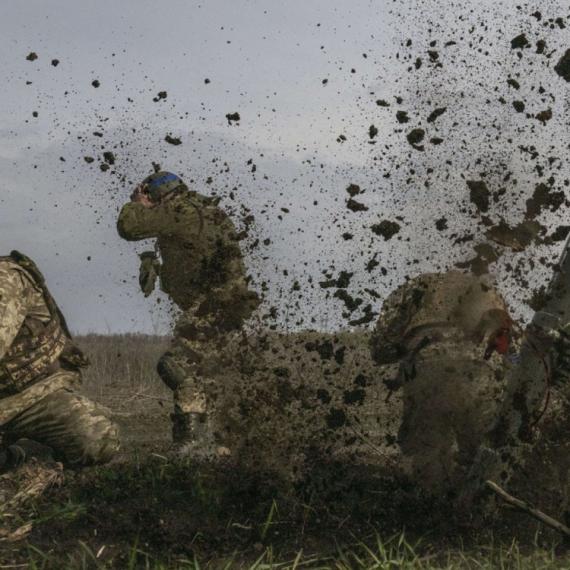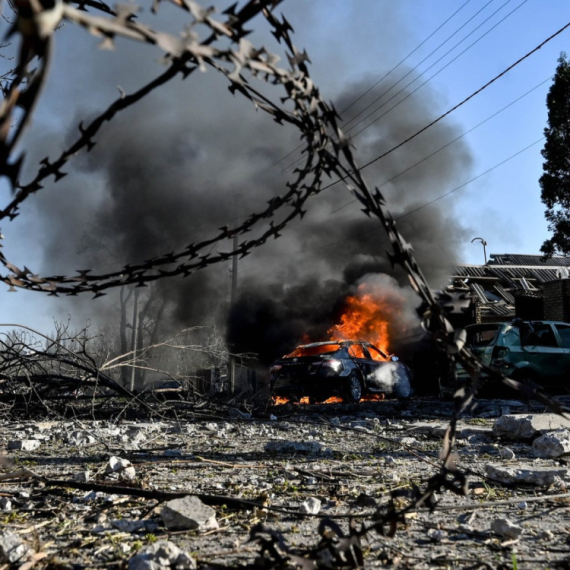Serbia marks anniversary of Nazi bombing of Belgrade
Serbia today marks the 70th anniversary of the beginning of the Nazi German aggression against the Kingdom of Yugoslavia, which started on April 6, 1941.
Wednesday, 06.04.2011.
12:50

Serbia today marks the 70th anniversary of the beginning of the Nazi German aggression against the Kingdom of Yugoslavia, which started on April 6, 1941. On that day, the Nazi air force launched an intensive bombing campaign targeting Belgrade and several other towns in Serbia. Serbia marks anniversary of Nazi bombing of Belgrade The attack of Hitler’s Third Reich started without a declaration of war, despite the fact that the Yugoslav government had declared Belgrade “an open (undefended) city” several days earlier. The first bombs hit the city on Sunday morning, April 6, at 06:30 CET while most Belgraders were still asleep. German bombers attacked with highly destructive and incendiary bombs four times during that day. About 30 infamous Hecht bombers took off from Romania around 16:00 CET and fired at refugees who were leaving the destroyed city in a panic. The planes were taking off from airports in Vienna, Graz and Arad, with 484 Luftwaffe planes targeting on April 6 and 7 in carpet-bombing attacks. The capital once again came under attack on April 11, and a day later. The city was also bombed during the night with 440 tons of the deadly cargo was dropped. The exact number of victims has never been determined. Official data says that 2,274 people were killed in Belgrade, which had 370,000 residents at the time, but according to some estimates almost 4,000 people lost their lives in the bombing. The city suffered immeasurable damage. 714 buildings were completely destroyed, 1,188 were severely damaged and 6,826 were partially destroyed, including the Old Palace’s dome. Several hundred civilians were killed and wounded in the yard of the Ascension Church on the first the day of the aggression and several hundred more died when a bomb shelter in Karadjordjev Park was directly hit. The National Library of Serbia at Kosancicev Venac Street, which was built in 1832, was completely destroyed. This was the only national library that had been deliberately targeted and destroyed during the Second World War. 350,000 of books, including priceless medieval manuscripts, were lost in a fire that was caused by incendiary bombs. The library also had a collection of Turkish manuscripts and more than 200 old printed books from the period between the 15th and 17th century. The Kingdom of Yugoslavia’s fate was determined with a coup d'état and demonstrations against the Tripartite Pact, which had been signed two days earlier by the Cvetkovic-Macek government. The demonstrations against the deal with the Nazi-led alliance were held on March 27, 1941 in Belgrade. On the eve of the biggest armed conflict of the 20th century, Belgrade was the only European capital where masses enthusiastically cheered against the agreement with Hitler and the Axis powers, singing patriotic songs and chanting the now famous slogans, “Better a war than the pact” and “Better in the grave than a slave”. This enraged the Nazi leadership because it disrupted the plans for the attack on the Soviet Union, so Hitler ordered the German Army the same day to, along with Greece, destroy Yugoslavia as a country. The central Serbian town of Kraljevo was also attacked on April 6 and about 600 people died in the bombing of the southern city of Nis on April 8. Leskovac, Kraljevo, Novi Sad and other Serbian towns were attacked, with strategic targets, infrastructure and airports destroyed by April 17, 1941 when the Army of the Kingdom of Yugoslavia capitulated. The Axis powers’ victory was fast and Yugoslavia capitulated in just 11 days despite the army’s attempts to protect the state borders, while King Peter II and the government fled the country three days earlier. In accordance with the Third Reich general plan, Yugoslavia was dismembered and divided among Germany, Hungary, Bulgaria and the Nazi-allied Independent State of Croatia (NDH), with Hitler’s forces occupying Serbia. Belgrade, April 6, 1941 (Tanjug)
Serbia marks anniversary of Nazi bombing of Belgrade
The attack of Hitler’s Third Reich started without a declaration of war, despite the fact that the Yugoslav government had declared Belgrade “an open (undefended) city” several days earlier.The first bombs hit the city on Sunday morning, April 6, at 06:30 CET while most Belgraders were still asleep.
German bombers attacked with highly destructive and incendiary bombs four times during that day. About 30 infamous Hecht bombers took off from Romania around 16:00 CET and fired at refugees who were leaving the destroyed city in a panic.
The planes were taking off from airports in Vienna, Graz and Arad, with 484 Luftwaffe planes targeting on April 6 and 7 in carpet-bombing attacks.
The capital once again came under attack on April 11, and a day later. The city was also bombed during the night with 440 tons of the deadly cargo was dropped. The exact number of victims has never been determined.
Official data says that 2,274 people were killed in Belgrade, which had 370,000 residents at the time, but according to some estimates almost 4,000 people lost their lives in the bombing.
The city suffered immeasurable damage. 714 buildings were completely destroyed, 1,188 were severely damaged and 6,826 were partially destroyed, including the Old Palace’s dome.
Several hundred civilians were killed and wounded in the yard of the Ascension Church on the first the day of the aggression and several hundred more died when a bomb shelter in Karađorđev Park was directly hit.
The National Library of Serbia at Kosančićev Venac Street, which was built in 1832, was completely destroyed.
This was the only national library that had been deliberately targeted and destroyed during the Second World War. 350,000 of books, including priceless medieval manuscripts, were lost in a fire that was caused by incendiary bombs.
The library also had a collection of Turkish manuscripts and more than 200 old printed books from the period between the 15th and 17th century.
The Kingdom of Yugoslavia’s fate was determined with a coup d'état and demonstrations against the Tripartite Pact, which had been signed two days earlier by the Cvetković-Maček government.
The demonstrations against the deal with the Nazi-led alliance were held on March 27, 1941 in Belgrade. On the eve of the biggest armed conflict of the 20th century, Belgrade was the only European capital where masses enthusiastically cheered against the agreement with Hitler and the Axis powers, singing patriotic songs and chanting the now famous slogans, “Better a war than the pact” and “Better in the grave than a slave”.
This enraged the Nazi leadership because it disrupted the plans for the attack on the Soviet Union, so Hitler ordered the German Army the same day to, along with Greece, destroy Yugoslavia as a country.
The central Serbian town of Kraljevo was also attacked on April 6 and about 600 people died in the bombing of the southern city of Niš on April 8. Leskovac, Kraljevo, Novi Sad and other Serbian towns were attacked, with strategic targets, infrastructure and airports destroyed by April 17, 1941 when the Army of the Kingdom of Yugoslavia capitulated.
The Axis powers’ victory was fast and Yugoslavia capitulated in just 11 days despite the army’s attempts to protect the state borders, while King Peter II and the government fled the country three days earlier.
In accordance with the Third Reich general plan, Yugoslavia was dismembered and divided among Germany, Hungary, Bulgaria and the Nazi-allied Independent State of Croatia (NDH), with Hitler’s forces occupying Serbia.








































Komentari 15
Pogledaj komentare